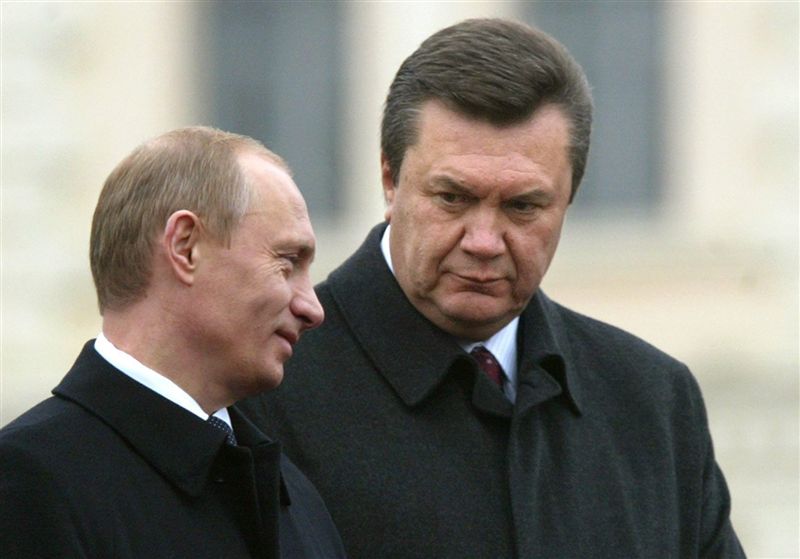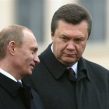
Poor Ukrainian-Russian Ties Reflect Yanukovych-Putin Relationship
Publication: Eurasia Daily Monitor Volume: 8 Issue: 180
By:

Ukraine’s poor relations with Russia are nothing new as they also existed under the “pro-Russian” Leonid Kuchma. Nevertheless, Kuchma had to deal with the more democratic Russian President Boris Yeltsin, whereas the certainty of Vladimir Putin returning as Russian President in March 2012 means that Moscow will continue to present a hard line toward Kyiv.
During the last two decades of Ukrainian independence, Kyiv’s relations with Moscow have followed predictable patterns. Moscow has always favored presidents elected by eastern Ukrainian, Russian-speaking voters, whether Kuchma or Yanukovych, but the promise of better relations has never appeared. With Ukrainian “nationalist” presidents, poor relations were inevitable. Leonid Kravchuk, elected in 1991 by Russophone voters, was quickly perceived by Moscow as a “nationalist” because he relied upon national democratic support and quarreled with Russia over the CIS, Black Sea Fleet (BSF), nuclear weapons and many other issues.
Yushchenko, elected in 2004, was always going to be even more suspicious in Putin’s eyes as the Russian leader had been personally humiliated by the Orange Revolution, an event viewed in Moscow and by Yanukovych as a US-backed conspiracy. Putin twice visited Ukraine in October-November 2004 to give support to Yanukovych and congratulated him on his election a day before the Central Election Commission announced the official results. Yushchenko was easy to portray as a “nationalist” villain because of his national identity and foreign policy orientation. Relations with Russia (and Poland) became especially strained over Yushchenko’s honoring of 1940s nationalist leaders and his support for Georgia during Russia’s August 2008 invasion.
In reality, Kuchma was as much of a “nationalist.” Kuchma “Ukrainianized” the country’s education system, and initiated the international campaign to designate the 1933 artificial famine (holodomor) as “genocide.” Kuchma twice requested NATO to offer Ukraine a Membership Action Plan (MAP) in 2002 and 2004 – the same number of attempts as Yushchenko in 2006 and 2008. Kuchma and Yanukovych had strained relations with Moscow for the same reason: namely, their eastern Ukrainian naivety about Russia and Slavic brotherhood. Eastern Ukrainian naivety has come face to face with Russian imperial-chauvinism, which does not accept the permanency or existence of Ukraine’s statehood. This is clearly revealed in private conversations with Western diplomats in Kyiv who are unfazed by Russian heavy handiness that they themselves have witnessed during previous tours of duty in Moscow. Putin told the NATO-Russia Council at the April 2008 Bucharest summit: “Well, you understand, George (Bush), Ukraine is not even a state,” adding “What is Ukraine? One part of its territory is in Eastern Europe, and the other part, the significant portion, was a gift from us” (UNIAN, April 18, 2008).
Putin mistakenly believes that “seventeen million are Russians,” mixing up Russophones with “Russians.” In Putin’s eyes, Ukraine is an artificial state where “one third is ethnic Russian,” which would disintegrate if tensions rose as in 2008-2009 when Russian espionage and subversion grew in the Crimea (see November 2010 Jamestown report: The Crimea: Europe’s Next Flashpoint?).
Moscow’s contempt for Ukrainian statehood has not abated despite Yanukovych’s far more pro-Russian position than Kuchma’s. Yanukovych extended the Sevastopol BSF base to 2047, dropped the pursuit of NATO membership and adopted the Russian position that the 1933 famine was Soviet-wide, denouncing the claim that the holodomor is a “genocide” or Ukrainian famine. Two years earlier, Yanukovych was the only CIS politician to support the independence of South Ossetia and Abkhazia.
A senior official in the Ukrainian government commented on the state of Russian-Ukrainian relations: “We had the illusion that everything would work out if we removed from our relations with the Russian Federation key irritants like recognition of the Holodomor [1930s famine] as genocide, plans to join NATO and the reluctance to extend the stationing of the Black Sea Fleet. But this has not happened” (Kommersant-Ukraina, June 21).
The Yanukovych administration, like every Ukrainian leadership, became exasperated by the inability of Russia to treat Ukraine on an equal footing. A senior Ukrainian official explained: “It is not we who are moving away from Russia, but the latter that pushes us off.” Yanukovych gave away so much, so quickly, for nothing – including the mythical 30 percent gas “discount.”
Yanukovych is faced by a more assertive, wealthier and aggressive Russia, which will again be led by Putin who has never hidden his disdain for Yanukovych. A January 2009 US cable from Kyiv leaked by WikiLeaks cites the then Ukrainian Ambassador to Russia, Kostyantyn Gryshchenko (now Foreign Minister), as stating that Putin hates Yushchenko and has a low personal regard for Yanukovych (Kyiv Post, March 11). Gryshchenko bemoaned to US Ambassador William Taylor that Moscow seeks a “regency” in Ukraine totally subservient to Moscow (Kyiv Post, March 11).
Putin’s hard-line policies toward Yanukovych escalated after Yulia Tymoshenko was accused of abuse of office for her signing of the January 2009 gas contract with Putin. One year earlier, the Kharkiv accords extending the BSF base had recognized the same contract. Yanukovych claimed that the Ukrainian government had taken this step because Russia had agreed to review the contract. Since then, Russia, in Yanukovych’s view, had betrayed them even though the terms of the 2009 contract “were written it seems for an enemy” (Kommersant-Ukraina, September 6).
Yanukovych complained during the Dushanbe CIS summit: “We are not poor relations…We are an independent state,” adding “At first they pushed us into a corner and then they began to dictate terms. This demeans not only myself personally but it demeans the state and I cannot permit this” (Kommersant-Ukraina, September 6).
Ukrainian officials have condemned the “information war” against Yanukovych and his economic nationalist oligarch allies (Ukrayinska Pravda, September 1). Party of Regions deputy Sviatoslav Oliynyk revealed the “mass ideological and technological parachutists” sent into eastern and southern Ukraine to turn the population against Yanukovych. “This ‘geopolitical process’ amounts to support for separatism,” he warned (Ukrayinska Pravda, September 9).
The deterioration in relations could be seen at the September 15-18 Yalta European Strategy (YES) summit, boycotted by Russia (https://yes-ukraine.org/ua/Yalta-annual-meeting/2011). In last year’s YES summit, Russia sent numerous senior figures in the firm belief that “their” man had been elected earlier that year (see analysis of this year’s YES summit by Serhiy Leshchenko in Ukrayinska Pravda, September 19, 23).
Kyiv’s strained relations with Moscow point to three conclusions. Firstly, Russia does not accept, or respect, Ukrainian sovereignty. Secondly, Yanukovych has received nothing in return for naive pro-Russian policies introduced after he was elected. These policies have given him less leverage than Kuchma possessed in the 1990s, when he used US support and cooperation with NATO to persuade Russia to moderate its position. Thirdly, by extending the Sevastopol base de facto indefinitely, Yanukovych has given Russia the ability to intervene and subvert the Crimea (Ukrayinsky Tyzhden, August 23). Tension is again growing with Ukraine, blocking the passage of Russian vessels in the Kerch straits (Ukrayinska Pravda, September 8).
Yanukovych’s inept attempts to pursue Kuchma-style multi-vector foreign policies have led to poor relations with Moscow and Brussels-Washington that have given him two potential pitfalls. Either Yanukovych can agree to join the CIS Customs Union, turning Ukraine into a Russian protectorate and in the process provoking widespread domestic instability through protests at the loss of Ukrainian independence. Or Yanukovych can mend relations with the West by releasing Tymoshenko from imprisonment leading to a Deep Comprehensive Free Trade Agreement with the EU, but risking the possibility that she may defeat him in the 2015 presidential elections.




